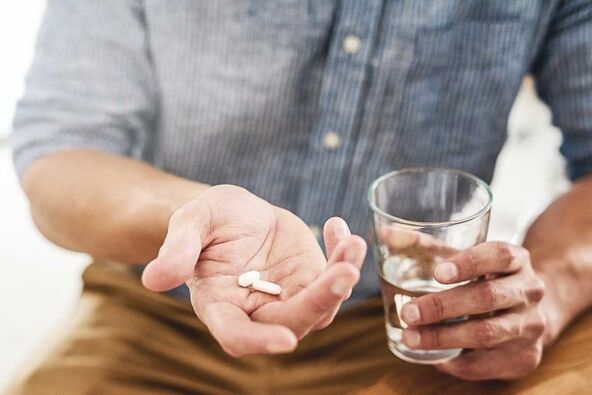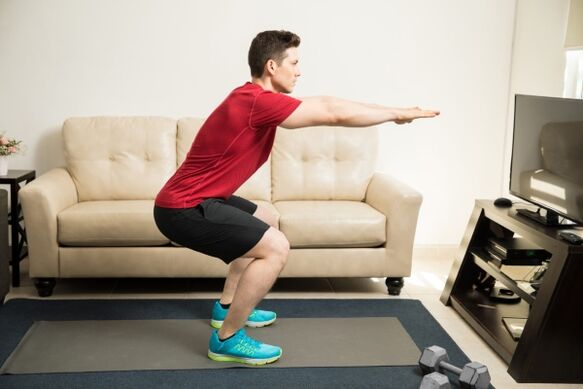Calculous prostatitis is a rare disease that requires special treatment. Therefore, it is important to know how it occurs and what symptoms it is accompanied by. In this article you will learn about all the features of the disease. Along with diagnosis and treatment methods.
Lime prostatitis is characterized by an inflammatory process in which conglomerates of a dense structure are formed. In other words, these are stones in the prostate. These are the elements that enter a person's body. The course of chronic prostatitis occurs in the secretion of the prostate gland against the background of pathological disorders.
Causes
Calcific prostatitis can be caused by:
- Infection of the genitourinary system. These include chlamydia, gonorrhea, trichomoniasis, ureaplasmosis and others. There may be diseases such as. In the process of reproduction and activation of pathological microorganisms, obstruction of the ducts of the prostate gland is noted, the secret of which is a thick and viscous structure. Thus, bacteria create a favorable environment for the formation of stones, and prostatolytics contribute to the increase of inflammatory processes, which leads to density in the prostate.
- Stagnation of all processes in the gland due to various reasons - the presence of adenoma (benign tumor) in the prostate, inactivity, the effects of harmful foods, alcohol abuse, smoking. However, in most cases, the reason is the lack of regular sexual activity, because in this case, the glands can not normally empty the calculus, and therefore stagnation occurs.
- Urethro-prostate reflux. In this disease, the prostate is excreted in small doses during urination. As urine accumulates, crystallized salts are released, which over time thicken and turn to stone. Urethro-prostate reflux, urethral damage, prostate atony, prostate resection, etc.
- Disruption of blood circulation in the pelvic organs also causes stagnation.
- Frequent hypothermia of the body and genitals.
- Failure to follow the rules of personal hygiene can lead to infection, which in turn leads to insignificant prostatitis.
- Old age. This is due to the formation of a kind of phosphoric acid and lime plaque in the thickened epithelium and amyloid bodies.
The stone formations are yellowish and spherical. The minimum size of prostatolites is 0, 25 cm, maximum 0, 4. They are formed alone or in large numbers, mainly of the following types: phosphate stones, oxalate or urate stones.
Symptoms
The following symptoms indicate the presence of prostatolites in the prostate:
- dull and aching pain in the perineum, groin, coccyx, scrotum;
- increased pain syndrome after physical activity, bowel movements, sexual intercourse, sitting in one position for a long time;
- sharp pain when urinating;
- intermediate jet;
- frequent urination with urinary retention;
- blood particles in urine and semen;
- premature ejaculation;
- weakening of power;
- increased body temperature;
- insomnia;
- decreased appetite;
- psycho-emotional instability.
Stages of bacterial prostatitis
- Primary or catarrhal.In the primary form, stones form in the prostate or ducts. Symptoms of the catarrhal type are poorly expressed, the symptoms are similar to catarrhal pathologies. If you consult a urologist in time and start the necessary treatment, you can get rid of the disease within a week.
- Secondary or follicular.In the secondary form, prostatolites penetrate the body from the kidneys, bladder and other elements of the body against the background of urolithiasis. After an untreated catarrhal type, a follicular appearance may develop. Manifestations are acute, there is an increase in body temperature and milk, the duration of therapy is long.
- Third or parenchymal.With the third form, the parenchyma of the prostate gland is affected, hence it is called parenchymal (diffuse). It is the last stage of an acute course in which the symptoms are very severe. A purulent exudate forms in the inflamed area. The treatment process is long, tolerance is difficult.
Possible complications of significant prostatitis
What complicates untreated calculus prostatitis:
- abscesses in the prostate against the background of accumulation of purulent fluid in the tissues;
- intoxication of the body with purulent formations and further development of fatal sepsis;
- prostate atrophy and consequent impotence;
- acute or chronic vesiculitis, characterized by vasodilation inside the spermatic cord, which leads to weakness and infertility;
- cystitis and urinary incontinence.
To prevent such results, it is necessary to go to the clinic and undergo a thorough examination at the first signs.
How to prevent an attack at home?
It is perfectly understandable for any sane person to call an ambulance during an attack. But you can take the usual painkillers before you arrive. If you have a propolis-based rectal suppository in your home office, perform the appropriate procedure. Eliminate pain and laxative tablets.
Which doctor is treating you?
A urologist (or andrologist) treats any form of prostatitis. Other highly qualified physicians - nephrologists, infectious disease specialists, and others, depending on the cause of the stones - are involved in the process of choosing the diagnosis and treatment tactics.
Diagnostics
At the first visit to the urology office, the doctor performs palpation and visual examination, and then collects a medical history. Lifestyle, the presence of certain pathologies and the nature of the symptoms must be taken into account. In addition, the following diagnostics are performed:
- collection of blood and urine for general analysis to determine the quantity (composition of biological fluids);
- seed collection (characterized by an increase in the number of sperm, epithelial tissues and amyloid organs, which is a calcareous type of prostatitis);
- spermogram allows you to study the degree of motility and sperm count;
- Prostate radiography;
- ultrasound examination of the prostate;
- computed or magnetic resonance imaging.
Blood collection is mandatory for PSA, which allows the detection of a specific prostate antigen (a sign of a tumor of the prostate gland).
Treatment of calcified prostatitis
The duration of therapy and the choice of therapeutic measures depends on the degree of neglect, the form of the disease, the cause of its development and the presence of complications.
Drug treatment
- The fluoroquinolone group for the destruction of pathogenic microbes that cause most prostatitis. These are antibiotics that can easily fight many pathogens.
- Penicillin group antibacterial agents.
- Tetracycline group antibiotics. However, tetracyclines have many side effects and are therefore less commonly prescribed than other groups.
- Cephalosporins are administered intramuscularly.
- Non-steroidal anti-inflammatory drugs eliminate pain syndrome, eliminate inflammation.
- The patient should take vitamin complexes to strengthen the immune system.

Surgical intervention
- Transurethral electroresection allows you to remove stones and cut blood vessels. For this, a high-frequency electric current entering the urethral lumen and a resectoscope are used. The operation is painless, but prostatolytic particles are likely to remain.
- Ultrasound-guided transurethral surgery. Unlike the previous method. Thanks to increased ultrasound tracking, all stones are removed.
- Strip prostatectomy (stones are removed by dissection) and endoscopic (using an endoscope inserted into the prostate). In addition to stones, resection of the prostate, lymph nodes and seminal vesicles is performed.
- Lithotripsy involves the use of a laser that crushes stones, which are then removed naturally. An endoscope is used for this.
Physiotherapy
- ultrasound exposure reduces the level of inflammation, relieves pain;
- laser therapy accelerates metabolic processes in the prostate, eliminates anxiety;
- Magnetic therapy restores blood circulation, neutralizes swelling.
Massage normalizes the permeability of the ducts, accelerates the blood supply, which is considered effective for prostatitis, but in its perfect form is strictly prohibited. The reason is that prostatolytics can move in the body.
If you do not have the opportunity to participate in physiotherapy procedures, you can do it at home using special devices. But keep in mind that physiotherapy is effective only in remission - the use of devices is prohibited when prostatitis is in exacerbation.
Dietary treatment
A patient diagnosed with calculous prostatitis has to follow a special diet prepared by a nutritionist at the individual level, depending on the severity of the pathology.
The basis of the diet is the rejection of alcoholic and carbonated beverages, fried, smoked, salty and spicy foods. The use of fatty meat and fish, mushroom-based broths is undesirable. Horseradish, radishes, radishes, garlic, cabbage, beans and onions should be excluded from vegetables. The rest of the products that cause gas.
Physiotherapy
It is always used for prostatitis, but with an insignificant form, the movements should be light to prevent the movement of stones. Gymnastics should stretch the muscles of the perineum. To do this, you can do the following exercises at a slow pace:
- Get up in a chair and put your hands behind your back. Raise one leg as high as possible and bring it to the side. Put your hand down. The same movements are performed with the other leg. The number of approaches is 8-10.
- Leaning on the back seat. Bend your knees and lift your legs to your abdomen in turn.
- Spread your legs wider than your shoulders, sit up and straighten your position for a few seconds. Stand up. When exercising, try to do spring exercises while squatting. Repeat no more than 5 times.

Folk remedies
- Raw 25-30 pumpkin seeds daily and always eat on an empty stomach.
- Herbal decoction. You need a bare ostudnik and a black letter in equal proportions. Separate 1 tbsp. l. herbs, pour 0, 5 liters of "cool" boiling water, infuse. Take 100 mg 3 times a day, half an hour before meals.
- Infuse brown rose hips root according to the recipe on the pharmacy package. Drink as a tea drink three times a day.
- Pour 2 tablespoons into a glass of boiling water. l. parsley seeds and boil for 10-15 minutes on low heat. Insist for an hour. Drink a tablespoon 6 times a day.
- Drink 600-1000 ml of freshly squeezed asparagus juice daily.
- Other natural juices are also useful - carrots, beets, cucumbers.
Forecast
In the treatment of calcified prostatitis, first of all, conservative therapy is used, the result is generally favorable. In negligent forms and in the absence of positive dynamics of drug treatment, surgery is used. In this case, the prognosis is favorable. However, special attention should be paid to the rehabilitation period to prevent infection and other complications.
Prevention measures
Follow the simple rules to prevent the development of a significant type of prostatitis and prevent relapse:
- eliminate bad habits;
- seek timely medical attention for any pathological disorder;
- strictly follow the instructions of the urologist;
- Do not overcool;
- use a condom to prevent infection;
- have an active sex life with a partner.
























